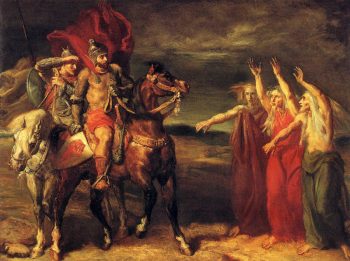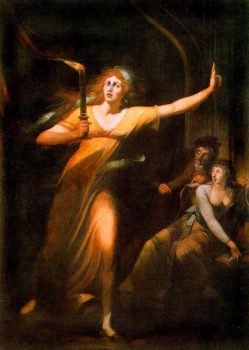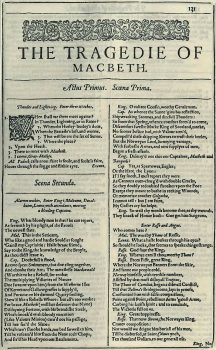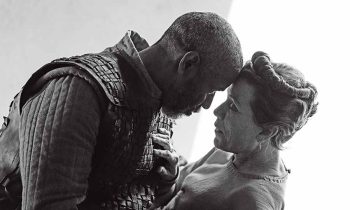All hail, Macbeth! that shalt be king hereafter!
Macbeth, ACT I, SCENE III
Looking back on my second time around here at Black Gate, I saw that each for the first two summers I’d undertaken the enjoyable, if somewhat pointless task, of writing about a Shakespeare play (for what can I possibly bring to such an effort). First, there was A Midsummer Night’s Dream, then The Tempest. I skipped last summer because a sense of inadequacy for the task had me struggling to finish my piece about T.H. White’s The Once and Future King (pt. 1, pt. 2).
Having already missed last month’s installment of my column due to an ongoing run-in with a 5 mm kidney stone, I decided getting back to Shakespeare might be just the thing to get me moving. But what to read? I’ve only read fourteen of his thirty-nine plays, so I don’t know which of them have fantastical elements. And, then, it smacked me on the head, Macbeth. Not only is it my favorite of the plays I’ve read, but it’s suffused with magic, all black and malign. Then, there are all the movie versions, including a recent one starring Denzel Washington and France McDormand. So, let me begin.
For those who’ve somehow missed reading Macbeth in 8th or 9th grade, it’s the story of a Scottish thane whose ambitious nature is spurred on by the prophecies of a trio of witches and his wife. To make himself king of Scotland he murders King Duncan. Once upon the throne becomes increasingly paranoid and begins to move against any her perceives as rivals; first his friend Banquo and later another thane, Macduff. When his enemies marshal ten thousand soldiers to march against his castle atop Dunsinane Hill, he believes himself impervious due to further prophecies delivered by the witches. In an instant of clarity, Macbeth realizes that witches being witches, their prophecies provide no real protection. Suffice it to say, as the play’s original title was The Tragedie of Macbeth, it does not end well for him.
Accursed be that tongue that tells me so,
For it hath cow’d my better part of man!
And be these juggling fiends no more believ’d,
That palter with us in a double sense;
That keep the word of promise to our ear,
And break it to our hope!
 What made me fall in love with Macbeth was the language. There’s a reason so many of its words have become woven into our language. I’m not so sure I agree with Harold Bloom’s assertion that Shakespeare created “humanity,” that is how we perceive our inner selves, but there’s no denying the psychological depth brought to his characterizations, all expressed in iambic pentameter. Not having all that much to add to any analysis of the play, let me provide some examples of what I’m describing.
What made me fall in love with Macbeth was the language. There’s a reason so many of its words have become woven into our language. I’m not so sure I agree with Harold Bloom’s assertion that Shakespeare created “humanity,” that is how we perceive our inner selves, but there’s no denying the psychological depth brought to his characterizations, all expressed in iambic pentameter. Not having all that much to add to any analysis of the play, let me provide some examples of what I’m describing.
First, in a single scene, as the witches are conjuring up chaos, they speak these immortal words:
Double, double, toil and trouble;
Fire, burn; and cauldron, bubble.
followed shortly by
By the pricking of my thumbs,
Something wicked this way comes.
Additionally, they use all manner of disgusting items for their magic, including “Scale of dragon, tooth of wolf,” and “Finger of birth-strangled babe.” I’m not sure if anything has done more to create the verbal imagery surrounding witches than this play.
Among his many memorable lines, Macbeth gets to deliver two brilliant soliloquies. The first concerns his seeming inability to resist murdering Duncan, drawn forward by a hallucinatory dagger. Here’s the first part of it.
Is this a dagger which I see before me,
The handle toward my hand? Come, let me clutch thee:—
I have thee not, and yet I see thee still.
Art thou not, fatal vision, sensible
To feeling as to sight? or art thou but
A dagger of the mind, a false creation,
Proceeding from the heat-oppressed brain?
I see thee yet, in form as palpable
As this which now I draw.
Thou marshall’st me the way that I was going;
The second, delivered upon learning of the death of his wife is much shorter.
MACBETH.
She should have died hereafter.
There would have been a time for such a word.
Tomorrow, and tomorrow, and tomorrow,
Creeps in this petty pace from day to day,
To the last syllable of recorded time;
And all our yesterdays have lighted fools
The way to dusty death. Out, out, brief candle!
Life’s but a walking shadow; a poor player,
That struts and frets his hour upon the stage,
And then is heard no more: it is a tale
Told by an idiot, full of sound and fury,
Signifying nothing.
I’ve seen it delivered wistfully, with complete exhaustion, and with great fury, but any way it’s done, it remains one of the most despair-filled things I’ve ever read. For all his “vaulting ambition” and the murders he committed and commissioned, his wife is dead and nothing matters. This is the stuff of purest existential nightmares.
And of course, Lady Macbeth, as strong an impeller for Macbeth’s actions as the witches’ words is blessed with remarkable lines of her own. Deciding her husband is “too full o’ th’ milk of human kindness,” she steels herself to gain the strength she’ll need to drive him forward.
The raven himself is hoarse
That croaks the fatal entrance of Duncan
Under my battlements. Come, you spirits
That tend on mortal thoughts, unsex me here,
And fill me, from the crown to the toe, top-full
Of direst cruelty! make thick my blood,
Stop up th’ access and passage to remorse,
That no compunctious visitings of nature
Shake my fell purpose, nor keep peace between
Th’ effect and it! Come to my woman’s breasts,
And take my milk for gall, your murd’ring ministers,
Wherever in your sightless substances
You wait on nature’s mischief! Come, thick night,
And pall thee in the dunnest smoke of hell
That my keen knife see not the wound it makes,
Nor heaven peep through the blanket of the dark
To cry, “Hold, hold!”
 Lady Macbeth is often held up as the paragon of the evil, manipulative wife, but she’s more than that. While Macbeth leans into his evil as he commits darker act after darker act, she pulls back from their first crime almost at once. By the play’s end, she’s psychically broken as displayed in one of her other famous scenes.
Lady Macbeth is often held up as the paragon of the evil, manipulative wife, but she’s more than that. While Macbeth leans into his evil as he commits darker act after darker act, she pulls back from their first crime almost at once. By the play’s end, she’s psychically broken as displayed in one of her other famous scenes.
DOCTOR.
Hark, she speaks. I will set down what comes from her, to satisfy my remembrance the more strongly.LADY MACBETH.
Out, damned spot! out, I say! One; two. Why, then ’tis time to do’t. Hell is murky! Fie, my lord, fie! a soldier, and afeard? What need we fear who knows it, when none can call our power to account? Yet who would have thought the old man to have had so much blood in him?DOCTOR.
Do you mark that?LADY MACBETH.
The Thane of Fife had a wife. Where is she now?—What, will these hands ne’er be clean? No more o’ that, my lord, no more o’ that: you mar all with this starting.
There’s so much more, including a weirdly incongruous comic scene with a drunken porter, the witches misleading Macbeth with more prophecies and Macbeth’s defiant last stand. The thing is, reading Shakespeare is great, but seeing it performed is better. Fortunately, if you can’t go see a production of Macbeth, there are several movie versions, four of which I’ve watched this past weekend. All these movies play games with the play’s text. Characters are condensed, scenes are moved around or eliminated entirely. That’s nothing new, but it’s something to keep in mind.
The first is Orson Welles’ 1948 Macbeth starring himself and Jeanette Nolan. It was made on the cheap for Republic Pictures. It’s best thought of as an interesting but failed experiment. Shot in
twenty-three days, Welles hoped to inspire other directors and studios to take gambles on making low-budget art films. The expressionistic sets and lighting are good, but aside from Welles, the rest of the cast is not memorable. Welles’ insistence on having everyone use a bad Scottish burr is especially distracting when everyone’s dressed like an outcast from a Mongol horde. His addition of a Christian versus pagan conflict feels as tacked on as it sounds.
 Next is Roman Polanski’s 1971 Macbeth. The first film he made after the murder of his wife and unborn baby, it’s a much grimmer and bloodier version than Welles’. Starring Jon Finch and Francesca Annis as the Macbeths, it’s my favorite. I find their portrayal of his descent to greater evil and hers to madness more affecting than in any of the other films. Polanski also has a better hand at portraying the explicit violence of the play and expanding it almost exponentially on the screen. His witches are also the most in keeping with the assorted medieval portrayals of them and the most naturalistic, making them the most revolting. Polanski also plays with one of the longstanding questions about the play — who is the Third Murderer — intriguingly. So intriguing that Joel Coen stole it almost entirely.
Next is Roman Polanski’s 1971 Macbeth. The first film he made after the murder of his wife and unborn baby, it’s a much grimmer and bloodier version than Welles’. Starring Jon Finch and Francesca Annis as the Macbeths, it’s my favorite. I find their portrayal of his descent to greater evil and hers to madness more affecting than in any of the other films. Polanski also has a better hand at portraying the explicit violence of the play and expanding it almost exponentially on the screen. His witches are also the most in keeping with the assorted medieval portrayals of them and the most naturalistic, making them the most revolting. Polanski also plays with one of the longstanding questions about the play — who is the Third Murderer — intriguingly. So intriguing that Joel Coen stole it almost entirely.
 I only just discovered Justin Kurzel’s 2015 Macbeth with Michael Fassbender and Marion Cottilard. Significant efforts were made to make it look like 11th century Scotland and the results are impressive. I wasn’t able to give it as much attention as it needed, by Fassbender is a captivating actor and I found his Macbeth intriguing.
I only just discovered Justin Kurzel’s 2015 Macbeth with Michael Fassbender and Marion Cottilard. Significant efforts were made to make it look like 11th century Scotland and the results are impressive. I wasn’t able to give it as much attention as it needed, by Fassbender is a captivating actor and I found his Macbeth intriguing.
Finally, there’s Joel Coen’s 2021 The Tragedy of Macbeth with Denzel Washington and Frances McDormand. It’s filmed in strikingly stark black and white and takes the expressionistic approach of Welles and runs for it off beyond the horizon. Much older than the roles are usually played, Washington and McDormand, bring a different feel to the characters. They’re not filled with youthful ambition, but with that of people late in their situations grasping at one last chance for everything. It’s a terrific movie and a very good take on the play.
I won’t discuss Akira Kurosawa’s Throne of Blood here. It’s his take on the story, but not a version of the play. Still, definitely check it out, because it’s a brilliant movie.
After rereading it and watching four different movies back to back, Macbeth remains my favorite of Shakespeare’s plays. It’s a short, sharp blast of violence and madness. Macbeth himself lacks the charisma and swagger of Richard III but he holds my attention from first to last. He’s evil, but he never makes excuses or back down. At one point, knowing how far he’s come from victorious hero he started out as, he knows there’s no turning back.
I am in blood
Stepp’d in so far that, should I wade no more,
Returning were as tedious as go o’er.
If you’re wary of Shakespeare, I can’t think of a better place to begin. Filled with witches, murder and swordplay, you will not be disappointed.
Fletcher Vredenburgh writes a column each first Sunday of the month at Black Gate, mostly about older books he hasn’t read before. He also posts at his own site, Stuff I Like when his muse hits him.


